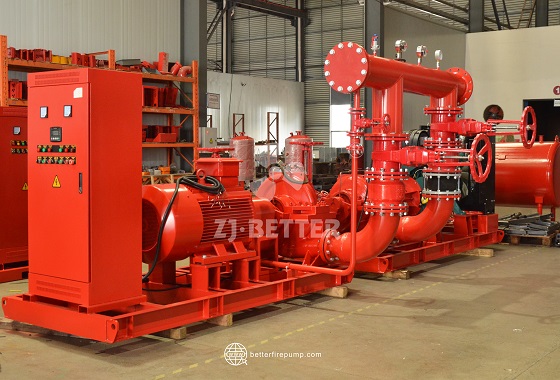In modern industrial construction and urban safety systems, the reliability of fire protection systems is directly related to the safety of life and property. With the continuous expansion of factories, warehouses, petrochemical parks, large shopping malls, and high-rise buildings, ensuring a continuous and stable fire water supply in emergency situations has become a critical issue. Large diesel fire pump units, with their independent power, high flow output, and strong adaptability, have become the preferred fire water supply solution for industrial sites.
1. Powerful Independent Power System
The greatest advantage of large diesel fire pump units is that they are independent of the electrical system. Fires often occur during power outages or power supply restrictions, which can render electric pumps ineffective. However, diesel engine-driven fire pumps can start independently, ensuring continuous water supply. The diesel engine's powerful output power enables high-flow pumps to achieve stable operation in a short period of time, making it particularly suitable for industrial sites with high water pressure and flow requirements.
2. High Flow and High Head Performance
Industrial sites typically occupy large areas and have complex pipe networks, placing higher demands on the flow and head of fire pumps. Large diesel fire pump units utilize a highly efficient hydraulic model design, enabling high-flow water supply while maintaining high head performance, ensuring fire water reaches every corner of the plant. Whether delivering water over long distances or supplying high-rise buildings, these units provide stable pressure and flow.
3. Stable and Reliable Structural Design
Stability and reliability are paramount performance indicators for firefighting equipment. Large diesel fire pump units typically feature a heavy-duty base, a sturdy pump body, and high-temperature-resistant seals to ensure stable operation even under extended periods of operation and extreme environments. Furthermore, the overall structure incorporates shock-absorbing and noise-reducing features to minimize vibration and noise during operation, ensuring the long-term safe operation of the equipment.
4. Intelligent Control System
With the advancement of intelligent technology, modern diesel fire pump units are equipped with advanced control systems that enable automatic detection, remote monitoring, and intelligent alarms. The system monitors parameters such as oil pressure, water temperature, and speed in real time, issuing an alarm or automatically switching operating modes if an anomaly is detected. Furthermore, some units support IoT connectivity, enabling management personnel to monitor and operate the units remotely, significantly improving management efficiency and emergency response speed.
5. Wide Range of Applications
Large diesel fire pump units have a wide range of applications, including petrochemical plants, power facilities, steel mills, warehouses and logistics centers, airports and terminals, large shopping malls, and high-rise buildings. Fires in these locations can be devastating, requiring firefighting equipment with high reliability and continuous water supply capabilities. Diesel fire pump units, with their powerful power and independent operation capabilities, provide reliable safety in these critical areas.
6. Rapid Startup and Emergency Response
When a fire breaks out, time is of the essence. Equipped with a rapid start system, diesel fire pump units can be up and running in seconds, quickly providing the required water pressure and volume to the firefighting network. This rapid response makes them exceptional in emergency situations, significantly improving firefighting success rates and reducing the risk of fire spread.
7. Durability and Long-Life Design
Equipment in industrial sites often operates for extended periods of time, so diesel fire pump units are designed with durability in mind. Core components are constructed of high-strength materials, offering excellent wear and corrosion resistance. The equipment undergoes rigorous operating simulation and fatigue testing to ensure stable performance over years of use, reducing maintenance costs and replacement frequency.
8. Ease of Maintenance and Service
Although diesel generator sets are complex in structure, modern units are designed for ease of maintenance. They feature modular components for easy disassembly and replacement. Furthermore, intelligent control systems record operating data, helping maintenance personnel quickly identify problems and improving maintenance efficiency. Regular maintenance, such as oil changes, filter cleaning, and cooling system inspections, can be completed quickly, ensuring long-term operation.
9. Compliance with International Standards and Regulations
The design and manufacture of large diesel fire pump units strictly adhere to international and industry standards, such as NFPA and ISO. Equipment certified to these standards is fully guaranteed in terms of safety, reliability, and performance. This means the units not only meet the needs of the domestic market but also meet the requirements of international engineering projects, enabling widespread use in industrial and infrastructure projects worldwide.
10. Cost-Effectiveness and Overall Value
While the initial investment in diesel fire pump units may be higher than that of some electric pumps, they offer significant long-term economic advantages. Independent power ensures reliability in emergencies, reducing the significant losses caused by equipment failure; a long-life design reduces maintenance and replacement costs; and an intelligent system improves management efficiency. These factors combine to make diesel fire pump units a highly cost-effective firefighting solution for industrial sites.
Large diesel fire pump units, as essential fire water supply equipment for industrial sites, offer efficient, safe, and reliable fire protection in various critical locations thanks to their independent power, high flow rate, high head, stable structure, and intelligent control. They will continue to play an irreplaceable role in future fire protection system development, becoming a cornerstone in safeguarding life and property.
